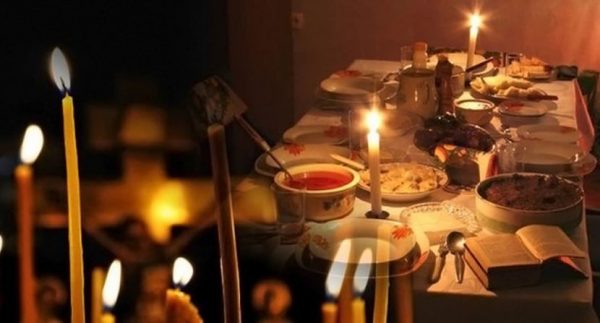As you know, Lent is time that’s set aside for us to prepare ourselves for Christ’s resurrection. It’s easy to ignore it and skip straight to Pascha—after all, Lent disrupts our lives and it seems like a lot of work!
But, if we do that, then we’ve ignored the fact that Christianity isn’t just about parties and celebrations (Pascha, weddings, and baptisms). Being a Christian is about “walking the Way.” It’s about *how* we live our lives on a daily basis.
In short, being a Christian is a lifestyle, not simply an ethnic heritage we’re born into. And, it’s not about going to church only when we “feel like it” or when we can “fit it into our schedules.”
Take fasting as an example.
We often think of fasting as simply a matter of food: what we can or cannot eat. And, if Facebook posts are any indication, I suppose many of us ignore the fast and continue to eat what we want anyway (though we would do well to heed St. Paul’s advice not to scandalize our brothers and sisters in Christ by forgoing meat posts of us breaking the fast, or any other posts that’s contrary to our Christian lifestyle: see I Corinthians 8:1-13).
But, a quick glance at scripture shows us that fasting is much more than food. It’s about learning to put aside our own egos so that we can learn to love our neighbor.
How does that work? I’m glad you asked! I’ll start with a quote from St. Paul,
“For salvation is nearer to us now than when we became believers; the night is far gone, the day is near. Let us then lay aside the works of darkness and put on the armor of light; let us live honorably as in the day, not in reveling and drunkenness, not in debauchery and licentiousness, not in quarreling and jealousy. Instead, put on the Lord Jesus Christ, and make no provision for the flesh, to gratify its desires.” (Romans 13:11b-14)
The idea is that we, in some way, are enslaved to our desires or passions, which lead us to look out for ourselves and satisfying our own cravings. This is the way of the world, and this is what drives us to act contrary to God’s teachings. These desires manifest themselves as many different sins, which some of Fathers group into two main categories: sins concerning greed (sins of the body) and sins concerning pride (sins of the mind).
However, by fasting, we are training our bodies to overcome one specific passion: gluttony. The idea is that if we can learn to conquer our hunger—rather than hunger controlling us—then we can use what we learned to gain control over the other passions in our lives. We can, little-by-little, make provisions not to gratify the desires of the flesh and, instead, put on Christ.
And, by putting on Christ, we are putting on the armor of light so that we can *live* honorably as in the day.
Now that you have a deeper insight into what it truly means to fast, and how that functions as a spiritual practice, you won’t be surprise to learn that Isaiah sees fasting to much more than food!
“Is not this the fast that I [God] choose:
to loose the bonds of injustice,
to undo the thongs of the yoke,
to let the oppressed go free,
and to break every yoke?
Is it not to share your bread with the hungry,
and bring the homeless poor into your house;
when you see the naked, to cover them,
and not to hide yourself from your own kin?” (Isa 58:6-7)
Can you imagine bringing a stranger into your house to live there? Yet, this is precisely what happened during WWII. Many Christians in Greece housed Jews in their homes to keep them safe from the Nazis. In the spirit of Isaiah, they were truly fasting.
But, WWII isn’t an exception. We still have injustices in our world. We still have neighbors who go hungry or need a place to live. There are still those who are oppressed in our society and they need an advocate.
In other words, we have a long way to go in order to “fast” according to Isaiah’s standard.
So, our challenge, then, is not to see fasting simply as a legalistic church requirement nor as a “prerequisite” for communion. Instead, our goal is to see fasting as a spiritual discipline that leads us to walk the Way, to “live out” our Christianity on a daily basis.
It may take a lifetime to truly learn to fast, but, with God’s help, all things are possible.
Blessed strength to you all!

















